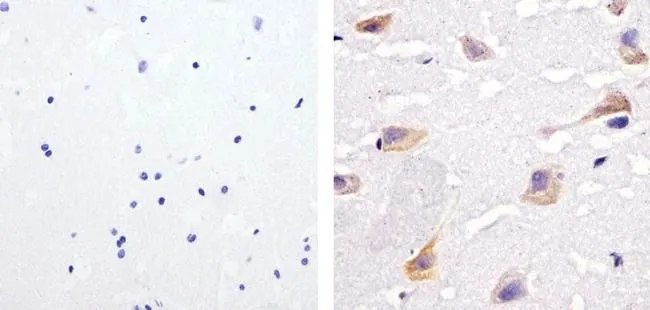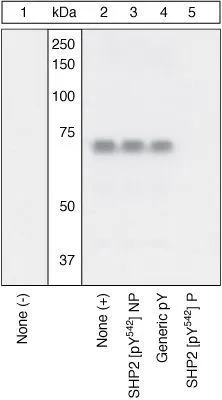
IHC-P analysis of human brain tissue using GTX17939 SHP2 (phospho Tyr542) antibody. Right : Primary antibody Left : Negative control without primary antibody Antigen retrieval : 10mM sodium citrate (pH 6.0), microwaved for 8-15 min Dilution : 1:20
SHP2 (phospho Tyr542) antibody
GTX17939
ApplicationsWestern Blot, ImmunoHistoChemistry, ImmunoHistoChemistry Paraffin
Product group Antibodies
ReactivityHuman, Mouse
TargetPTPN11
Overview
- SupplierGeneTex
- Product NameSHP2 (phospho Tyr542) antibody
- Delivery Days Customer9
- Application Supplier NoteIHC-P: 1:20. *Optimal dilutions/concentrations should be determined by the researcher.Not tested in other applications.
- ApplicationsWestern Blot, ImmunoHistoChemistry, ImmunoHistoChemistry Paraffin
- CertificationResearch Use Only
- ClonalityPolyclonal
- ConjugateUnconjugated
- Gene ID5781
- Target namePTPN11
- Target descriptionprotein tyrosine phosphatase non-receptor type 11
- Target synonymsBPTP3, CFC, JMML, METCDS, NS1, PTP-1D, PTP2C, SH-PTP2, SH-PTP3, SHP2, tyrosine-protein phosphatase non-receptor type 11, SH2 domain-containing protein tyrosine phosphatase 2, protein-tyrosine phosphatase 1D, protein-tyrosine phosphatase 2C
- HostRabbit
- IsotypeIgG
- Protein IDQ06124
- Protein NameTyrosine-protein phosphatase non-receptor type 11
- Scientific DescriptionThe protein encoded by this gene is a member of the protein tyrosine phosphatase (PTP) family. PTPs are known to be signaling molecules that regulate a variety of cellular processes including cell growth, differentiation, mitotic cycle, and oncogenic transformation. This PTP contains two tandem Src homology-2 domains, which function as phospho-tyrosine binding domains and mediate the interaction of this PTP with its substrates. This PTP is widely expressed in most tissues and plays a regulatory role in various cell signaling events that are important for a diversity of cell functions, such as mitogenic activation, metabolic control, transcription regulation, and cell migration. Mutations in this gene are a cause of Noonan syndrome as well as acute myeloid leukemia. [provided by RefSeq, Aug 2016]
- ReactivityHuman, Mouse
- Storage Instruction-20°C or -80°C,2°C to 8°C
- UNSPSC12352203




![Various whole cell extracts (30 microg) were separated by 7.5% SDS-PAGE, and the membrane was blotted with SHP2 antibody [SD20-75] (GTX01144) diluted at 1:500. The HRP-conjugated anti-rabbit IgG antibody (GTX213110-01) was used to detect the primary antibody.](https://www.genetex.com/upload/website/prouct_img/normal/GTX01144/GTX01144_HJ0727_20200228_WB_w_23053121_967.webp)
![WB (peptide competition) analysis of HEK293 cells treated with 100 ng/mL PMA for 15 minutes using GTX17940 SHP2 (phospho Ser576) antibody prior incubated with the non-phosphopeptide corresponding to the phosphopeptide immunogen (Lane 3), a generic phosphoserine-containing peptide (Lane 4), the phosphopeptide corresponding to SHP2 [pS585] (Lane 5), the phosphopeptide corresponding to SHP2 [pS591] (Lane 6), or the phosphopeptide immunogen (Lane 7)control. The data show that only the immunogen phosphopeptide blocks the signal, demonstrating the specificity of the antibody. The membrane treated with phosphatase (Lane 1) eliminates the signal further verifying that the antibody is phospho-specific.](https://www.genetex.com/upload/website/prouct_img/normal/GTX17940/GTX17940_1559_WB_w_23060620_906.webp)